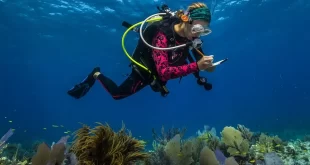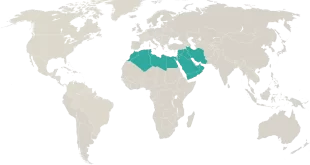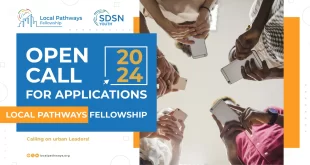The speed and quality of the development of science capacity in Africa and the rest of the developing world depends not only on infrastructure and the technical training of people, but is intimately linked to the quality of leadership to lead change. It is widely accepted that the future of scientific development lies in enabling interdisciplinary, interconnected and often large, international teams. Training structures are, however, often not set up to prepare a next generation of scientists for the complexities that an interconnected, interdisciplinary approach to science entails. There is an internationally emerging paradigm that recognizes that the focus on individual leadership is often inadequate to address complex challenges, which require skills across many sectors and collaborative processes. The ASLP will therefore focus on developing collective leadership skills that will help fellows contribute to the UN Sustainable Development Goals (SDGs).
Overview of the Programme
The ASLP is an initiative of the University of Pretoria in partnership with the Global Young Academy, funded by the Robert Bosch Stiftung. It serves early- to mid-career researchers in basic and applied science, engineering, social sciences, arts and the humanities. The programme aims to grow mid-career African academics in the areas of thought leadership, team development, engagement and collaboration, with the intention of enabling them to solve the complex issues that face both Africa and the global community.
The leadership programme:
- Identifies early- to mid-career academics who have demonstrated leadership potential and an interest in developing key leadership skills
- Supports them to apply the acquired skills to projects that are relevant to the academic development on the continent and its impact on society
- Creates a network of academic leaders on the continent, spanning not only across countries, but also across disciplinary boundaries
- Advances a curriculum for academic leadership development, which can be utilised in institutions in Africa and beyond.
Programme Structure
The programme will use a highly interactive approach to training, application of skills to a leadership project, peer support, and mentorship. Fellows will attend an initial 5 day, intensive on-site programme in Pretoria, South Africa from 20-25 March 2020 (departing on the 26th). The process will involve an approach that cycles between theory, application and reflection. Participants will be challenged to work collaboratively to design initiatives that advance a new paradigm for African science.
The training will cover:
- Core elements of collective leadership
- Creative and systems thinking
- Development of effective networks
- Stakeholder engagement for change
- Maximising the efficiency and impact of collaborative efforts
- Advanced dialogue and communication skills
- Effective problem solving and decision making
Following the first training week, fellows will apply their skills to a project relevant to their context and the Sustainable Development Goals (SDGs). As described above, projects will aim to contribute to a new paradigm for Africa science. During the year, participants will continue to engage with the group and have access to professional support. The costs incurred during the workshop (training, relevant travel, meals and accommodation) will be covered by the programme. In March 2021, fellows will complete their projects and present them at the second in-person training, which will consist of 3 days.
Expected commitment
The ASLP is seeking candidates who are committed to developing leadership in Africa. The training itself requires the time commitment of the two multi-day training sessions. Furthermore, fellows will be expected to develop their leadership project and engage with other fellows for peer support.
There will be some costs, which are not covered by the programme, such as visas, vaccinations or local transport expenses, for which you may need to seek support from your local institution or fund personally. You will also be required to provide us with your personal travel insurance details as a condition of participation.
Selection criteria and application process
To be selected, applicants need to display a compelling vision of their future involvement in the development of research projects, programmes, human capacity, specific policies or societal structures. The selection process will consider individual qualities but also focus on ensuring a diversity of culture, subject background (Natural and Social Sciences, Humanities) and gender among the fellows. Where possible the programme will also attempt to create small ‘cores’ of leadership; multiple strong applicants from the same centre or country will thus be considered.
The following criteria are used as a guide for the nomination and selection of fellows:
- A PhD degree or equivalent qualification;
- A faculty or a continuing research position at a research institution;
- Active in research and teaching at an African institution of higher education or research;
- A sustained record of outstanding scientific outputs;
- Interest in translating and communicating the results of their work for impact in society;
- Demonstrated leadership ability in research and beyond;
- Interest in the role of research in addressing complex issues affecting society;
- Interest in collaborations across disciplines and sectors (e.g. industry, government, etc.);
- Commitment to participate in all the activities of the fellowship; and
- Intent to share what is learned in the programme with their broader networks.
All applicants have to provide two support letters by academic referees (details are provided in the application form). One of the two referees has to commit to be involved in future communications and mentorship in case of selection of the applicant into the programme. This referee will be informed about the progress of the fellow and should be willing to support the fellow if he or she requires it.
All applications will be reviewed and shortlisted by representatives of the University of Pretoria, the Global Young Academy, national young academies, and ASLP Management. The ASLP Management team will make the final selection of candidates.
Key dates:
| 20 December 2019 | Applications close |
| 01 February 2020 | Outcome letters sent to applicants |
| 19 March 2020 | Arrival of fellows, to begin training on the 20th |
 medjouel.com Study Non Stop
medjouel.com Study Non Stop



